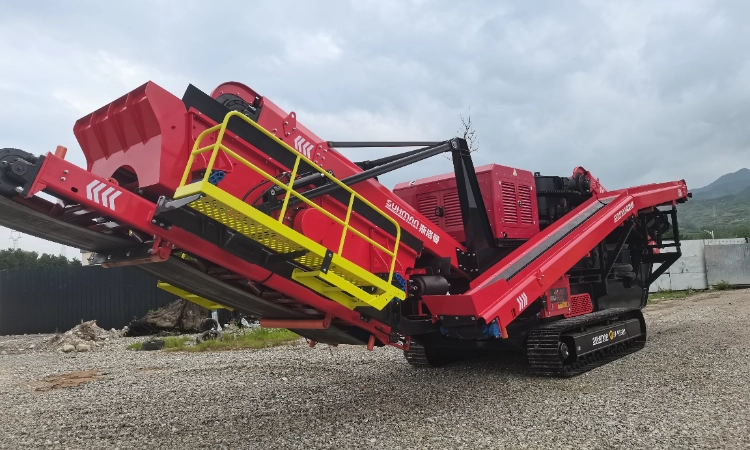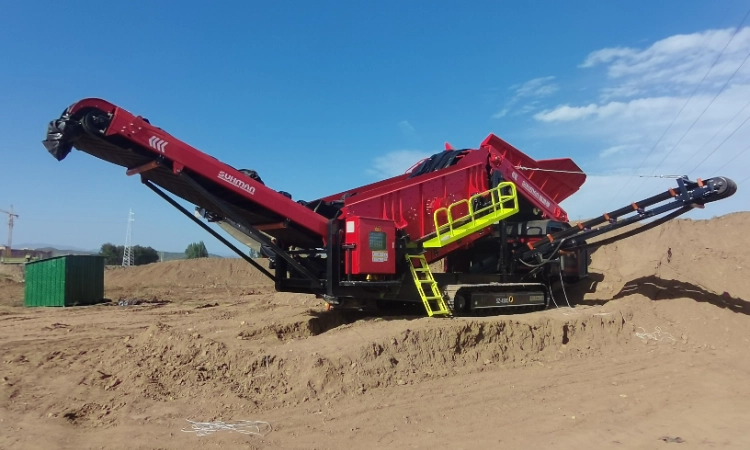A mobile screening plant is a piece of equipment designed to separate materials into different sizes and grades, enabling the efficient processing of raw materials on-site. These plants are typically equipped with vibrating screens, conveyors, and other mechanisms that help classify materials according to their size, quality, and use. The mobility of these plants allows them to be easily moved between different locations, making them highly flexible and adaptable to various types of construction or mining projects.
Mobile screening plants are ideal for projects that require continuous material processing or where transportation of materials is difficult. They are particularly useful in large-scale projects such as road construction, quarry operations, or mining, where large quantities of raw materials need to be sorted, graded, and processed quickly and efficiently.

The Role of Mobile Screening Plants in Enhancing Efficiency
Mobile screening plants are designed to enhance efficiency in several ways. Below, we break down the key benefits they offer and explain how they streamline material processing.
1. Reduced Transportation Costs and Delays
One of the most significant advantages of using a mobile screening plant is the elimination of the need for long-distance transportation of raw materials. Traditional material processing often requires transporting materials from the source to a stationary plant, which can result in high fuel and transportation costs. With a mobile screening plant, the equipment can be brought directly to the material source, allowing for on-site processing.
By processing materials where they are mined or extracted, transportation costs are drastically reduced. Additionally, this on-site processing eliminates the delays associated with moving materials back and forth, improving project timelines.
Table 1: Comparison of Transportation Costs
| Type of Screening Process | Traditional Fixed Plant | Mobile Screening Plant |
|---|---|---|
| Transportation of raw materials | High | Low |
| Time spent on transporting materials | Significant | Minimal |
| Fuel and labor costs | Expensive | Reduced |
2. Increased Operational Flexibility
Mobile screening plants offer exceptional flexibility in operation. Traditional stationary plants are limited to specific locations and require extensive setup when moved. In contrast, mobile screening plants can be easily relocated to different parts of a construction site, minimizing downtime and enhancing overall productivity.
This flexibility is particularly important for large projects or sites where material processing needs to occur in multiple locations. Instead of having to move materials to a stationary plant, the mobile unit can be relocated quickly to handle processing at various areas on-site. This capability ensures that material processing can continue uninterrupted, even as the project site evolves.
3. Improved Productivity and Reduced Downtime
A major benefit of mobile screening plants is their ability to run continuously with minimal interruptions. Traditional fixed plants may experience downtime due to transportation delays, maintenance issues, or logistical challenges. Mobile screening plants, on the other hand, are designed to work efficiently without the added hassle of moving materials between distant locations.
With advanced features such as vibrating screens and sorting mechanisms, mobile plants can process a high volume of materials quickly and consistently. This increased processing speed allows construction teams to meet tight project deadlines and significantly boosts overall productivity.
Table 2: Efficiency Gains Using a Mobile Screening Plant
| Factor | Without Mobile Screening Plant | With Mobile Screening Plant |
|---|---|---|
| Material processing speed | Slower | Faster |
| Downtime due to transport | High | Low |
| Material handling efficiency | Reduced | Optimized |
4. Better Quality Control and Consistency
Mobile screening plants help maintain better quality control by accurately sorting and grading materials. By processing materials directly on-site, the chances of contamination or improper grading are minimized. The plants can separate materials into precise categories, ensuring that only materials of the right size and quality are used in construction or mining.
For example, the plant can screen out smaller particles, dirt, or debris that may affect the quality of the final product. As a result, construction teams can be confident that the materials they use meet the required standards for strength, durability, and safety.
5. Versatility for Different Material Types
One of the standout features of mobile screening plants is their versatility. These plants can process a wide range of materials, including sand, gravel, crushed stone, asphalt, and even recycled materials. With various screen configurations, mobile screening plants can handle different material types and sizes, making them adaptable to a variety of industries and applications.
For instance, in road construction, mobile screening plants can be used to sort aggregates for asphalt production. In mining or quarrying, the plant can screen out waste materials and separate valuable minerals or ores. This versatility allows mobile screening plants to be utilized across a broad spectrum of industries, making them a highly adaptable solution for material processing.
6. Eco-Friendly and Sustainable Practices
As industries become more focused on sustainability, mobile screening plants contribute to greener operations. By reducing the need for transportation, mobile screening plants help decrease fuel consumption and carbon emissions. The ability to process materials on-site means fewer trucks are needed to transport materials, lowering the overall environmental impact of the project.
Furthermore, mobile screening plants are often used in recycling applications, where they help sort and process materials like crushed concrete or asphalt. By recycling these materials directly on-site, companies can reduce waste, promote sustainability, and contribute to a circular economy by reusing materials rather than sending them to landfills.

7. Enhanced Scalability and Adaptability
For large construction projects or mining operations, scalability is essential. Mobile screening plants are designed to be easily scaled to meet the demands of a growing project. Whether the project requires more screening capacity or different configurations to process various materials, mobile screening plants can be expanded by adding more units or adjusting the equipment.
This scalability ensures that the mobile screening plant can handle projects of varying sizes, from small residential developments to large industrial construction sites.
Table 3: Scalability of Mobile Screening Plants
| Project Size | Small Projects | Large Projects |
|---|---|---|
| Plant configuration | Basic setup | Multiple units |
| Material processing needs | Low to moderate | High capacity |
| Adaptability to site | High | Very high |
8. Reduced Labor Costs
Because mobile screening plants automate much of the material processing, the need for manual labor is significantly reduced. Traditional methods of sorting materials often involve heavy manual labor, which can be costly and time-consuming. Mobile screening plants, on the other hand, require fewer operators and can run efficiently with minimal supervision.
This reduction in labor costs helps improve the overall profitability of a project and allows the construction or mining team to allocate resources more effectively.
Why Choose a Mobile Screening Plant for Your Project?
The benefits of mobile screening plants in construction and mining operations are clear: they offer cost savings, increased efficiency, and improved quality control. By processing materials directly on-site, mobile screening plants help reduce downtime, transportation costs, and environmental impact, all while enhancing productivity and scalability.
For companies seeking a reliable, efficient, and sustainable solution for material processing, mobile screening plants are an essential investment.
